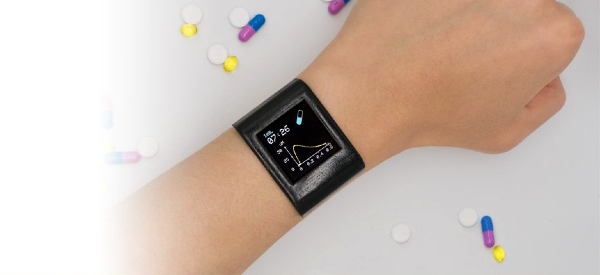
There are so recent many developments in sweat analysis technology that we’re beginning to wonder if sweat might replace blood in standard medical labs tests. (Actually, we know it won’t but it could be a valuable addition to the diagnostic and monitoring toolkit.) A team at the University of California San Diego has developed a wearable sensor that tracks Vitamin C levels in sweat. Researchers at the National University of Singapore (NUS) fabricated a flexible, highly-responsive pH sweat sensor. Earlier this summer, we wrote about engineers from the UCLA Samueli School of Engineering who developed a two-sided adhesive film that collects, analyzes, and converts biochemical markers from sweat into electrical signals.
Even more recently, the UCLA researchers teamed up with colleagues at Stanford School of Medicine to demonstrate a smartwatch that tracks drug levels by analyzing chemicals in sweat. The motivation behind the work was to create wearable technology to continuously and non-invasively track medications in the body. With accurate drug level analysis, clinicians would be able to personalize dosage and timing for individuals to improve therapeutic treatment to deliver optimal outcomes.
Many drugs have small enough molecular sizes to show up in body sweat in concentrations similar to blood. In testing the smartwatch’s ability to monitor acetaminophen, the researchers stimulated sweat glands on the wrist with a tiny electric current. According to a report of the study published in the Proceedings of the National Academy of Sciences, individual drugs have unique electrochemical signatures. When a user wears the smartwatch, sensors designed to detect specific electrochemical signatures monitor medication levels by tracking changes in body chemistry.
With the UCLA/Stanford smartwatch, users don’t have to give blood samples or even work up a sweat, because the tiny current is enough to produce a sufficient amount of sweat to monitor medication levels. According to the researches, adaptations of the technology could monitor medication adherence and drug abuse.

